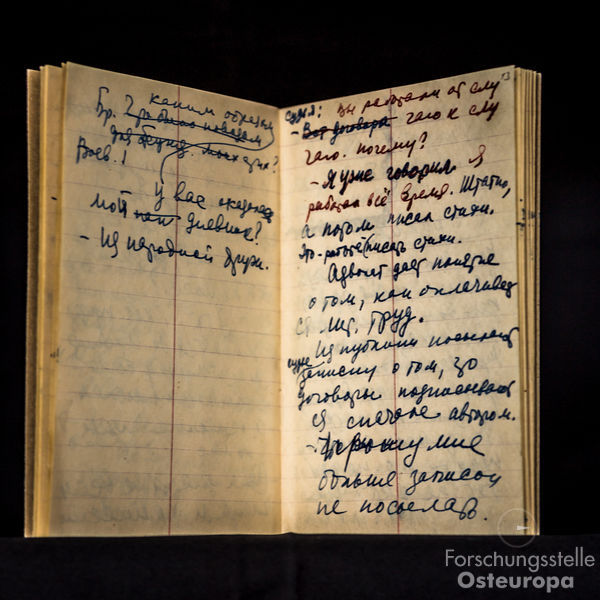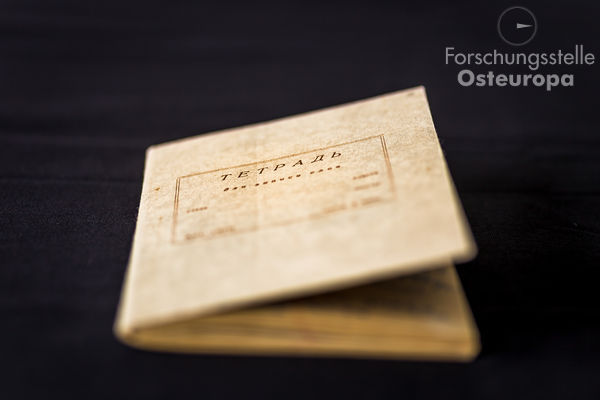"Unissued Diplomas"
17:00, Europapunkt Bremen
Ausstellungseröffnung
17:00, Europapunkt Bremen
Ausstellungseröffnung
Buchvorstellung
18:00 Uhr
Annette Schuhmann
Wir sind anders! Wie die DDR Frauen bis heute prägt.
Buchvorstellung
18:00 Uhr
An Evening with Maksym Butkevych
Europapunkt
18:00 Uhr
An Evening with Maksym Butkevych
Europapunkt
Wissenswertes
The Transcript of Joseph Brodsky’s Trial
On Frida Vigdorova’s 100th Anniversary and 50 Years since Brodsky’s Release from Internal Exile
When the poet Joseph Brodsky was put on trial for “social parasitism” in 1964 in Leningrad, the campaign in his defence received worldwide resonance thanks to the transcript of the writer, journalist and human rights activist Frida Vigdorova (born March 16, 1915). Her handwritten notebook is our archival document of the month. Evidently, Frida Vigdorova gave it to Lidia Chukovskaya, who later presented the notebook to Raisa Orlova with the inscription on the envelop: "An original piece of the 'Transcript' made at the 2nd court hearing". The notebook is now held at Forschungsstelle Osteuropa as part of Lev Kopelev's and Raisa Orlova's archive.

Foto: Fabian Winkler Fotografie. Quelle: Archiv der Forschungsstelle Osteuropa, Bremen, FSO 01-003 Kopelev
The year 2015 marks several vital dates in Soviet cultural history, including the 100th anniversary of Frida Vigdorova, as well as fifty years since her death. It also celebrates the seventy-fifth anniversary of Joseph Brodsky and fifty years since his release from exile in the northern village Norenskaya, where he spent a year and a half.
The transcript of Brodsky’s trial circulated both in Russia and abroad, resulting in the publication of his first book of poetry in 1965 (Inter-Language Literary Associates, Washington, DC). The trial had two court hearings: on February 18 and March 13, 1964. With an official permission to attend both, even when she was ordered to stop writing, Vigdorova managed to record in her notebook the dialogues between the judge and the defendant. After each hearing, she would run to a nearby café to restore parts of the courtroom atmosphere she was not able to write down on the spot. Her record is, thus, not a “stenogram,” but an evidence consisting of words recorded immediately and those restored from memory shortly thereafter. Before releasing it to samizdat, several other people present at Brodsky’s trial read through the transcript and corrected what they remembered otherwise.

Foto: Fabian Winkler Fotografie. Quelle: Archiv der Forschungsstelle Osteuropa, Bremen, FSO 01-003 Kopelev
Before Brodsky’s trial, his name had never appeared abroad in the Russian émigré press. But when the first selection of his five poems came out in the newspaper Russkaia Mysl’ on May 5, 1964, they were accompanied by a “Note on the Affair of Joseph Brodsky,” which was based on Vigdorova’s record. However, it was not until January, 1965, that the full version of Vigdorova’s transcript appeared in the original language (Vozdushnye puti, No. 4, published by Roman Grynberg).
Frida Vigdorova died of cancer in Moscow on August 7, 1965, only a month and a half before Brodsky was able to come back to Leningrad from exile. Her transcript of Brodsky’s trial marked the beginning of a new stage of the poet’s literary career and became one of the most important documents of his age.
Further Reading:
Alexandra Raskina: Frida Vigdorova’s Transcript of Joseph Brodsky’s Trial: Myths and Reality, Journal of Modern Russian History and Historiography 7 (2014), S. 144-180.
Lev Loseff: Joseph Brodsky: a Literary Life, New Haven 2011.
Яков Клоц: Как издавали первую книгу Бродского [How Brodsky’s First Book Was Published]. May 24, 2015: http://www.colta.ru/articles/literature/7415
Yasha Klots
Länder-Analysen
Die Länder-Analysen bieten regelmäßig kompetente Einschätzungen aktueller politischer, wirtschaftlicher, sozialer und kultureller Entwicklungen in Mittel- und Osteuropa sowie Zentralasien. Alle Länder-Analysen können kostenlos abonniert werden und sind online archiviert.
» Länder-Analysen
» Eastern Europe - Analytical Digests
» Länder-Analysen
» Eastern Europe - Analytical Digests
Discuss Data
Archiving, sharing and discussing research data on Eastern Europe, South Caucasus and Central AsiaOnline-Dossiers zu
» Erdgashandel
» Hier spricht das Archiv
» Russian street art against war
» Dissens in der UdSSR
» Duma-Debatten
» 20 Jahre Putin
» Protest in Russland
» Annexion der Krim
» sowjetischem Truppenabzug aus der DDR
» Mauerfall 1989

